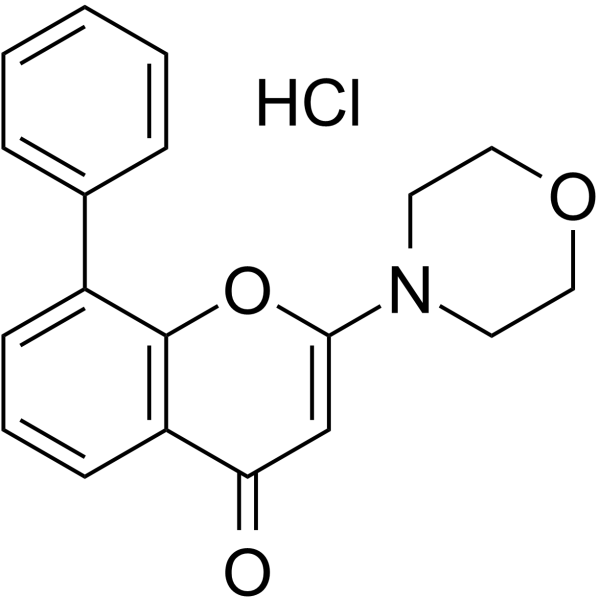LY-294,002 hydrochloride

LY-294,002 hydrochloride structure
|
Common Name | LY-294,002 hydrochloride | ||
|---|---|---|---|---|
| CAS Number | 934389-88-5 | Molecular Weight | 343.80400 | |
| Density | N/A | Boiling Point | N/A | |
| Molecular Formula | C19H18ClNO3 | Melting Point | N/A | |
| MSDS | Chinese USA | Flash Point | N/A | |
Use of LY-294,002 hydrochlorideLY294002 hydrochloride is a potent and broad-spectrum PI3K inhibitor, with IC50 values of 0.5, 0.57, and 0.97 μM for P110α, P110δ and P110β, respectively. LY294002 hydrochloride also inhibits CK2 with an IC50 of 98 nM. LY294002 hydrochloride can be used for pancreatic cancer research[1][2][3]. |
| Name | 2-morpholin-4-yl-8-phenylchromen-4-one,hydrochloride |
|---|---|
| Synonym | More Synonyms |
| Description | LY294002 hydrochloride is a potent and broad-spectrum PI3K inhibitor, with IC50 values of 0.5, 0.57, and 0.97 μM for P110α, P110δ and P110β, respectively. LY294002 hydrochloride also inhibits CK2 with an IC50 of 98 nM. LY294002 hydrochloride can be used for pancreatic cancer research[1][2][3]. |
|---|---|
| Related Catalog | |
| Target |
CK2:0.098 μM (IC50) CK2α2:3.869 μM (IC50) |
| In Vitro | LY294002 hydrochloride (0-75 μM; 24 hours and 48 hours) remarkably decreases human nasopharyngeal carcinoma CNE-2Z cells in a dose-dependent fashion[4]. LY294002 hydrochloride (0-75 μM; 24 hours and 48 hours ) induces CNE-2Z cells apoptosis rate in dose-dependent[4]. LY294002 hydrochloride (10-75 μM) significantly decreases p-Akt (S473) expression levels and up-regulates caspase-9 activity in CNE-2Z cells. Total Akt protein level is not difference with different concentration[4]. LY294002 hydrochloride (5, 10, 100 µM; for 2 hours) treatment partially suppresses Lysophosphatidic acid (LPA)-induced (20 µM; for 4 hours) nuclear translocation of YAP, accompanied by a reduction in p-AKT levels[6]. Cell Proliferation Assay Cell Line: CNE-2Z cells[4] Concentration: 0 μM, 10 μM, 25 μM, 50 μM, and 75 μM Incubation Time: 24 hours and 48 hours Result: Decreased CNE-2Z cells in a dose-dependent fashion. Apoptosis Analysis Cell Line: CNE-2Z cells[4] Concentration: 0 μM, 10 μM, 25 μM, 50 μM, and 75 μM Incubation Time: 24 hours and 48 hours Result: Induced apoptosis rate in a dose-dependent manner. Western Blot Analysis Cell Line: CNE-2Z cells[4] Concentration: 0 μM, 10 μM, 25 μM, 50 μM, and 75 μM Incubation Time: 24 hours and 48 hours Result: Decreased phosphorylated Akt (S473) expression levels were significantly, up-regulated caspase-9 activity in CNE-2Z cells in treated group. |
| In Vivo | LY294002 hydrochloride (10, 25, 50, 75 mg/kg; i.p.; twice weekly; for 4 weeks) significantly reduces mean NPC tumor burden in a dose-dependent manner. LY294002 (10, 25 mg/kg) is less effective in decreasing tumor burden[4]. LY294002 hydrochloride (1.2 mg/kg per day; i.p.; for 14 days) prevents Leptin (60 ug/kg)-induced adverse effects on spermatozoa in Sprague-Dawley rats[5]. Animal Model: Athymic nude mice (6-8 weeks) with CNE-2Z xenograft[4] Dosage: 10 mg/kg, 25 mg/kg, 50 mg/kg, and 75 mg/kg Administration: IP; twice weekly, for 4 weeks Result: Mean Nasopharyngeal carcinoma (NPC) tumor burden was remarkably decreased in a dose-dependent manner. |
| References |
| Molecular Formula | C19H18ClNO3 |
|---|---|
| Molecular Weight | 343.80400 |
| Exact Mass | 343.09800 |
| PSA | 42.68000 |
| LogP | 4.16360 |
| Storage condition | 2-8°C |
| Personal Protective Equipment | Eyeshields;Gloves;type N95 (US);type P1 (EN143) respirator filter |
|---|---|
| RIDADR | NONH for all modes of transport |
|
Alpha-lipoic acid activates eNOS through activation of PI3-kinase/Akt signaling pathway.
Vascul. Pharmacol. 64 , 28-35, (2015) Lipoic acid (LA) exerts therapeutic effects on cardiovascular diseases. However, the mechanisms underlying these therapeutic effects remain elusive. Endothelial nitric oxide synthase (eNOS) plays a cr... |
|
|
Neuritogenic Activity of Tetradecyl 2,3-Dihydroxybenzoate Is Mediated through the Insulin-Like Growth Factor 1 Receptor/Phosphatidylinositol 3 Kinase/Mitogen-Activated Protein Kinase Signaling Pathway.
Mol. Pharmacol. 88 , 326-34, (2015) Tetradecyl 2,3-dihydroxybenzoate (ABG-001) is a lead compound derived from neuritogenic gentisides. In the present study, we investigated the mechanism by which ABG-001 induces neurite outgrowth in a ... |
|
|
Deficiency of Factor VII activating protease alters the outcome of ischemic stroke in mice.
Eur. J. Neurosci. 41(7) , 965-75, (2015) Factor VII activating protease (FSAP) is a circulating protease with a putative role in hemostasis, remodeling and inflammation. A polymorphism giving rise to low proteolytic activity has been associa... |
| LY-294,002 hydrochloride |